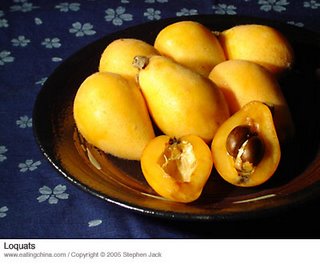Rose By Another Name
 Our avuncular masseuses Diana has bestowed upon us some wonderful little edible gems which Guillermo had never tasted before while I had not seen for a very long time. She brought us a basket of Pi Pa (枇杷) or loquats.
Our avuncular masseuses Diana has bestowed upon us some wonderful little edible gems which Guillermo had never tasted before while I had not seen for a very long time. She brought us a basket of Pi Pa (枇杷) or loquats.The loquat, Eriobotrya japonica, is one of the few important fruit trees of the tropics belonging to the Rosaceae (Rose) family. The fruit is indigenous to China and often mentioned in ancient Chinese literature, the most famous being poems of Li Bi(李白).
Sometimes the loquat is called Japanese medlar probably because it somewhat resembles the medlar of Asia. It has been grown from antiquity in Japan and India and is cultivated also in Indochina, the Mediterranean region, and to some extent in the New World subtropics. Chinese immigrants are presumed to have carried the loquat to Hawaii, and now I guess, Argentina.
The small ornamental evergreen trees yield yellowish, oval fruits which are borne in clusters and taste somewhat like apples or pears. They are commonly eaten fresh but are used also for making jam, jelly, pie, and sauces. The Chinese use loquat leaves to make medicinal syrup, like a cough drop, for soothing the throat.
The Japanese are now the major producer of loquats which they call Biwa. Chika at she who eats paired the fruit beautifully with her delicate Jasmine Tea Bavarois. Obachan at her Kitchen & Balcony Garden used Biwa to top her Ume jam tarts.
Guillermo's dear friend, Miguel, has often tasted weird and wonderful things provided by me; if we could stop ourselves from picking at the clusters of fruits, maybe we could leave some for him to sample on Sunday.
The heritage of loquat has inspired me to make scones (real scones, not like those in panaderías here which have egg and lots of sugar in the dough). Why? For no reason other than being able to put a dollop of that fragrant but very sweet rose jelly (Jalea de Rosa) from Alimentos Natali in my mouth!


<< Home